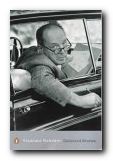a critical examination of Nabokov’s collected stories
 In ‘That in Aleppo Once…’ (May 1943) he returns to the same themes as ‘Spring in Fialta’ – recapturing the past, a woman, or a country that has been lost – and he gives the material a new twist by providing an outer frame to the narrative which technically ‘sets’ the story in the USA. It takes the form of a letter written by a Russian émigré in Central Park to his fellow countryman ‘V’, relating the incidents of his emigration and inviting him to make a story out of it.
In ‘That in Aleppo Once…’ (May 1943) he returns to the same themes as ‘Spring in Fialta’ – recapturing the past, a woman, or a country that has been lost – and he gives the material a new twist by providing an outer frame to the narrative which technically ‘sets’ the story in the USA. It takes the form of a letter written by a Russian émigré in Central Park to his fellow countryman ‘V’, relating the incidents of his emigration and inviting him to make a story out of it.
His tale combines two elements – the narrator’s flight from Paris to the south of France, and his brief marriage to a woman who has made him so unhappy that he now wishes to doubt her existence. She is much younger than him, and in recording this fact he draws parallels with Pushkin and Othello, both of whom were jealously possessive of their young wives.
On their honeymoon and escape journey to Marseilles he is separated from her when their train pulls off from a brief stop, leaving him on the platform. When he locates her some days later in Nice she tells him she met a man and spent some time with him in Montpellier. This sends the narrator into paroxysms of jealousy, after which she admits that her story was a lie – told perhaps to test him. But when they eventually obtain exit visas she disappears again, for good. The narrator goes on to New York alone, wants to forget her, and is very unhappy.
In terms of meta-fiction there is an interesting twist to the story in that it ends by the narrator imploring his friend V not to take up the Othello references in the story: ‘It may all end in Aleppo if I am not careful. Spare me, V: you would load your dice with an unbearable implication if you took that for your title’ (ND,p.157).
Since the story does have part of the famous quotation as its title, the implication is that V is publishing the letter and that therefore the narrator has committed suicide like Othello. Certainly from various hints in his narrative we are led to suspect that he is not psychologically stable.
His jealousy leads him to incessant questioning of his wife: ‘It went on like that for aeons, she breaking down every now and then…answering my unprintable questions’ (p.151) and possibly to a physical ill treatment of her: ‘I could imagine the accursed recurrent scene…with the dim limbs of my wife as she shook and rattled and dissolved in my violent grasp’ (p.151).
This appears to be confirmed when, searching for his wife after she has finally left him, a third party in whom she has confided accuses him of being a ‘bully and a cad’ (p.154). But his wife has also told this woman that the narrator hanged their pet dog before leaving Paris, and we know that there is no dog: it is one of her fabrications. And since we have her own evidence that she is capable of sustaining a lie, we are therefore in a dilemma. Whose testimony do we accept, knowing that it is all being presented to us by the narrator?
There does not seem to be any answer to this problem: we are forced to accept the general account given to us by the narrator – of an older, jealous man married to a capricious young woman. That we may do so with some confidence is suggested by the fact that it is a subject about which Nabokov writes over and over again throughout his writing life. There is a whole study to be made of Nabokov’s persistent interest in adultery in general and cuckoldry in particular. ‘That in Aleppo Once…’ is a successfully short variation on one of his favourite themes.
© Roy Johnson 2005
![]() Vladimir Nabokov: The Collected Stories – Amazon UK
Vladimir Nabokov: The Collected Stories – Amazon UK
![]() Vladimir Nabokov: The Collected Stories – Amazon US
Vladimir Nabokov: The Collected Stories – Amazon US
Vladimir Nabokov web links
Vladimir Nabokov greatest works
Vladimir Nabokov criticism
Vladimir Nabokov life and works